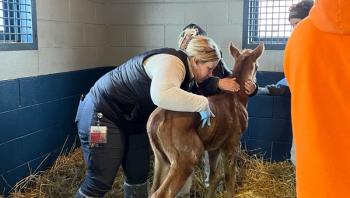
AVMA vies to foster bond with welfare, breed groups
Washington ? In a town where political isolation begets a legislative death sentence, the American Veterinary Medical Association (AVMA) reports some once-unusual alliances now bolster the profession's Washington agenda.
WASHINGTON — In a town where political isolation begets a legislative death sentence, the American Veterinary Medical Association (AVMA) reports some once-unusual alliances now bolster the profession's Washington agenda.
Atop AVMA's unity list is the Humane Society of the United States (HSUS) and American Kennel Club (AKC) — two powerful groups that often reside on opposite ends of the philosophical spectrum. With one closely tied to welfare activism and the other advocating breeders' rights, many AVMA positions fall squarely in between with regard to animal health.
The new partnerships have surprised and dismayed some allied veterinarians who are skeptical of any alliance with HSUS, which they consider an animal rights group. Yet plenty of room exists for solidarity on issues ranging from disaster preparedness to regulations on puppy mills, AVMA leaders say. At presstime, officials were proofing a five-point letter to Congress outlining the AVMA/HSUS joint agenda. Last November, AVMA President Dr. Henry Childers testified aside AKC Chairman Ronald Menaker before the U.S. Senate in favor of an Animal Welfare Act amendment.
"We're just getting to know each other," Childers says. "Then it's a matter of talking about the issues. If we can come to common agreements, we can accomplish a lot together."
Building phase
That work costs money, and compared to AVMA, HSUS has it. While AVMA operates a $23-million budget, HSUS' 9.4 million members contribute enough to warrant a $100-million budget annually. By contrast, AKC budgets up to $65 million a year with money largely stemming from the sale of breed registrations as the world's largest non-profit registry.
The extra fuel helps when it comes to pushing initiatives, says Dr. Mike Chaddock, director of the AVMA Governmental Relations Division. Still, disagreements are likely, he says.
"Be it HSUS or anyone else, there are going to be a lot of different legislative issues we don't support," he says. "We have to be able to identify those and agree to disagree. I really don't believe you can have a litmus test for this. This is too small a town to demand that."
Avoiding landmines
That's Wayne Pacelle's contention. While the HSUS president takes time to publicly condemn Vice President Cheney's recent hunting mishap and chide the United States Department of Agriculture (USDA) on its horse slaughter stance, he embraces AVMA initiatives that include an anti-animal fighting bill, a measure to add a bittering agent to antifreeze, legislation to protect captive primates and support for the Pet Animal Welfare Statute as well as the Pet Evacuation and Transportation Standards Act.
"I believe veterinarians speak with special credibility on animal welfare issues; our surveys on public attitudes show that," Pacelle says.
Yet conflict strikes when contentious issues arise, such as the American Horse Slaughter Prevention Act. While HSUS lobbied for last year's passage, AVMA worked in vain to stop the measure based on lack of care for the animals that remain when humane slaughter isn't an option.
"A lot of people make these assumptions that vets are automatically going to side with animal welfare policies, but historically many veterinarians have worked with animal industry," Pacelle says. "They embrace the use of animals, and that creates a certain amount of tension."
'Slippery slope'
Dr. Tom Burkgren represents a group of food animal veterinarians. As head of the American Association of Swine Veterinarians, he's already battling HSUS on an Arizona ballot initiative to ban sow gestation stalls and views any type of alliance with HSUS as "suspect." The mistrust revolves around the organization's stance against modern production systems, Burkgren says.
"HSUS is the biggest player and the greatest concern for veterinary medicine," he says. "They actively oppose the livelihood of most food animal veterinarians. I don't have a problem with AVMA talking to them; I have a problem with an alliance. I think it's very difficult to embrace an organization on one issue and hold them at arms length on another."
AVMA has fundamental differences from HSUS, Burkgren adds. "They capitalize and raise money on animal welfare whereas our members are on the farms every day making a difference on animal welfare," he says.
Baby steps
That doesn't mean conflicting groups can't come together to create a stronger political force, Chaddock says. The trick is balance, Childers adds.
"We don't want to threaten AVMA veterinarians in food animal practice," he says. "Before we decide anything that demands big change, the whole profession would have to buy into it. It's not going to be in a dark room somewhere."
That caution is displayed by both sides, Menaker says. Yet AKC sees an advantage to enhancing its political image even though members don't agree with all AVMA policies.
"Unfortunately the American public, including veterinarians, fails to recognize that the American Kennel Club goes far beyond registering dogs and sponsoring events," Menaker says. "We want to work with AVMA on veterinary outreach on a variety of subjects, ranging from how we educate folks on how to pick a breed to how they should raise and train their dogs"
HSUS has its own ideas about canine selection, and they are far removed from dog shows. But when it comes to more mainstream issues, DVMs prove an asset, Pacelle says.
"Veterinarians are professional people with tremendous knowledge of animals; it helps to have them on our side," he says.
Newsletter
From exam room tips to practice management insights, get trusted veterinary news delivered straight to your inbox—subscribe to dvm360.




